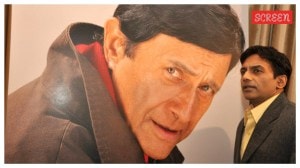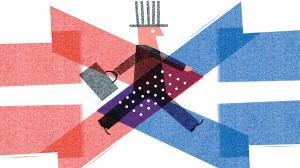Despite help from Centre, patients with rare diseases, kin continue to suffer
Rare diseases are lifelong conditions and 95 per cent of them have no approved treatment. In cases where drugs are available, they are prohibitively exorbitant.
 Mumbai’s King Edward Memorial (KEM) Hospital is one of the 11 designated Centres of Excellence in India. (Express photo by Ganesh Shirsekar)
Mumbai’s King Edward Memorial (KEM) Hospital is one of the 11 designated Centres of Excellence in India. (Express photo by Ganesh Shirsekar) Forced to drop out of school, Fakir Siraj Ali’s five-year-old son spends most of his days in bed. In 2021, when the country was in the grip of the second wave of Covid-19, the boy started having seizures, lost his appetite, and started feeling fatigued and bruising easily. Fakir rushed from one hospital to another in his native village, Panpur in Gujarat’s Sabarkantha district, but local doctors failed to diagnose the boy. After almost two months of struggle and spending over Rs 40,000 on diagnostic tests, the child was diagnosed with a very rare genetic disorder called Gaucher disease (GD). The disorder involves the build-up of fat-laden Gaucher cells in areas like the spleen, liver and bone marrow.
Rare diseases are debilitating lifelong conditions and approximately 95 per cent of them have no approved treatment. It is estimated that only one in 10 patients receive disease-specific treatment. Access and availability to drugs is key to reducing mortality linked to rare diseases. Even in cases where drugs are available, they are prohibitively exorbitant.
Fakir, who works in a mobile repair shop where he earns less than Rs 10,000 per month, recalled the horror he felt when he was informed that he would need to spend about Rs 30 lakh per annum on the treatment of GD, which usually occurs in children and has an incidence of about 1 in 5,000 births.
In a move that could reduce the cost of these drugs, the Centre on March 30 took the significant decision to exempt from basic customs duty all drugs and foods for special medicinal purposes, imported for treatment of all rare diseases listed under National Policy for Rare Diseases (NPRD), 2021. The March 30 announcement comes close on the heels of three other decisions taken by the Centre to augment access to treatment for patients with rare diseases.
The Centre had in May 2022 announced that it will provide financial support up to Rs 50 lakh to patients suffering from any category of rare diseases who are being treated in 11 Centres of Excellence (CoEs) across the country. It also launched a digital portal for crowdfunding and voluntary donations for patients of rare diseases. Finally, it allowed the CoEs to seek financial assistance from drug manufacturers and the corporate sector under their Corporate Social Responsibility (CSR) scheme.
As a result, according to the Health Ministry’s reply in the Rajya Sabha on March 21, financial assistance has been released to CoEs for treatment of 150 patients. “Out of these 150 patients, Rs 50 lakh each in respect of 41 patients has been released to the CoEs,” the Health Ministry statement said.
Despite these steps, there are several challenges when it comes to access to swift treatment for rare diseases. Nothing better illustrates these challenges than the daily hassle faced by patients suffering from rare diseases at Mumbai’s King Edward Memorial (KEM) Hospital, one of the 11 designated CoEs.
After his son’s GD diagnosis, Fakir travelled 150 km to Ahmedabad Civil Hospital twice a week with his son for life-saving enzyme replacement therapy due to lack of medicines in the backward Sabarkantha district. “It relieved him of pain. He was also able to play with his friends again,” said Fakir.
However, the family’s world came crashing down when the Ahmedabad hospital refused to continue the boy’s treatment and asked them to get registered at KEM Hospital in Mumbai. “We travelled to Mumbai and got him registered. We had hoped that he would recover soon with proper treatment, but we just got one date after another,” said Fakir, who also has two daughters.
In January, after receiving a call from the hospital, the family submitted a form to claim financial aid of Rs 50 lakh under NPRD. As of March 31, the hospital’s rare disease selection committee was yet to send his application to the national rare disease committee for the grant. Due to this, his life-saving treatment has derailed further. Meanwhile, the boy continues to suffer in silence. Due to the build-up of certain fatty substances in his spleen and liver, his stomach has enlarged abnormally.
“Most nights, he keeps crying in pain. He has become too weak to even walk. He just lays motionless in bed,” said Fakir. “I can’t see him in such a frail condition anymore.”
Nearly 230 km away from Mumbai, Yogesh Kajabe, a farmer from Ahmednagar’s Khandarmal village, earns around Rs 15,000 per year. He has already spent his meagre savings on the diagnosis and treatment of his only child, a three-year-old daughter, who suffers from GD. She requires two injections worth Rs 1 lakh each per month.
“No food stays in her stomach. It passes through her within minutes. Her stomach is expanding like a balloon due to her failing liver. I am scared that I might lose her,” said Yogesh. “As a father, it pains me to see my only child inch closer to death because I cannot afford the life-saving medicines she needs.”
The cost of her annual treatment is Rs 1 crore, which is beyond the reach of most Indians. Unlike Fakir, the hospital hasn’t even informed Yogesh about the Centre’s financial aid since KEM Hospital is not accepting applications for financial help from patients whose first-year treatment cost is above the capped amount.
Like Fakir and Yogesh, Keyush Joshi also approached KEM for his child’s treatment. And like Yogesh, Keyush was not allowed to register his son for financial aid. His nine-year-old son suffers from Duchenne muscular dystrophy (DMD), a condition that causes progressive muscle degeneration and weakness. Keyush says he does not have the Rs 6.9 crore his son needs per annum to manage his condition.
“I cannot afford to pay for the annual treatment my son needs to manage his condition. He is being given steroids instead. These steroids have made his bones weak and caused other severe side-effects,” he said.
Poor parents often end up spending all their savings on diagnostics, including some that can cost upto Rs 1 lakh. In some cases, diagnostic inefficiencies lead to misdiagnosis.
 Mumbai’s KEM Hospital is not accepting applications for financial help from patients whose first-year treatment cost is above the capped amount. (Express photo by Ganesh Shirsekar)
Mumbai’s KEM Hospital is not accepting applications for financial help from patients whose first-year treatment cost is above the capped amount. (Express photo by Ganesh Shirsekar)
Dipak Annarao Deshpande (35), a farmer from Maharshtra’s Jalna, turned permanently deaf due to stress and anxiety after his only daughter was diagnosed with DMD. One of the most severe forms of inherited muscular dystrophy, the average life expectancy of a DMD patient is around 27 years.
“Due to tension, his blood pressure shot up. It resulted in inner ear haemorrhage,” said his brother Nana Deshpande.
Dipak, who works in a sugar cane factory, earns less than Rs 7,000 per month. This makes it impossible for him to pay Rs 52 lakh per annum for his daughter’s treatment, who always feels fatigued because of the disease. DMD has also enlarged her calves, much to the amusement of the villagers.
“People make fun of my niece, so we always make her wear pants,” said Nana.
Dipak sold off his agricultural land to pay for his daughter’s diagnosis. “No one agreed to lend us money. So my brother sold off his land to pay Rs 1 lakh for tests at private laboratories,” said Nana. “Now he doesn’t even have money to repair the roof of his house before monsoon.”
To ease off diagnostic expenses, NPRD states that CoEs would get one-time financial support of up to Rs 5 crore for procurement of equipment as per the individual centre’s need for strengthening patient care services for screening, diagnosis and prevention (prenatal diagnosis) of rare diseases based on a gap analysis.
When asked about it, Dr Akash Shukla, the coordinator of CoE at KEM, said, “We haven’t received the fund … once we get it, we will set it up. Until then, we will have to outsource the diagnostics outside, which is costly.”







